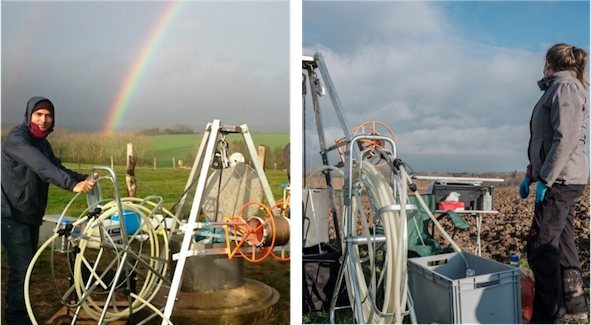PhD project offered by the IMPRS-gBGC in July 2025
Decoding Groundwater Ecosystem Functions through Multi-Omics: Impacts of Geology and Weather Extremes in the Subsurface Critical Zone |
|
Kirsten Küsel,
Gerd Gleixner
|
Project descriptionThe terrestrial Critical Zone (CZ)—extending from the vegetation canopy through soils and aquifers—hosts a multitude of tightly coupled physical, chemical, and biological processes (Brantley et al., 2017). Within this complex system, groundwater ecosystems play a vital but often overlooked role in mediating biogeochemical cycling, sustaining water quality, and hosting diverse microbial life (Roth et al., 2019; Spracklen et al., 2018; Wegner et al., 2019). However, the influence of geological setting on subsurface microbiomes and their role in ecosystem functioning remains poorly understood, particularly under conditions of environmental stress such as weather extremes which can affect groundwater quality (Schroeter et al., 2024).This PhD project will leverage the extensive infrastructure and long-term datasets of the Collaborative Research Center AquaDiva, specifically focusing on the Hainich Critical Zone Exploratory (CZE) and the Saale-Elster-Observatory (SESO). These contrasting field sites offer unique opportunities to investigate the links between geological heterogeneity, microbial community structure, and biogeochemical processes in groundwater systems. In March 2025, an unprecedented multi-omics campaign was conducted across AquaDiva field sites, generating a rich dataset that includes:
Research Objectives and QuestionsThe central objective of this PhD project is to analyze and integrate multi-omics and DOM datasets to identify microbial and molecular signatures that reflect ecosystem functioning and vulnerability in contrasting groundwater systems.The project will address the following key questions:
Approach and MethodologyThe PhD candidate will work with an interdisciplinary team to process and integrate high-dimensional biological and geochemical datasets. Core methods will include:
Environment and SupervisionThe PhD project will be embedded in the International Max Planck Research School for Global Biogeochemical Cycles (IMPRS-gBGC) and conducted in close collaboration with the Max Planck Institute for Biogeochemistry, Friedrich Schiller University Jena, former partners of the CRC AquaDiva, and PIs of the Excellence Cluster Balance of the Microverse. The candidate will join a dynamic, interdisciplinary research environment with access to state-of-the-art omics and geochemical laboratories, computational infrastructure, and field observatories.Affiliation and supportThe PhD candidate will be affiliated to the chair "Aquatic Geomicrobiology" at the Institute for Biodiversity, Ecology and Evolution at FSU Jena and the "Molecular Biogeochemistry" group at MPI-BGC. The successful PhD candidate jointly work with other PhD candidates on the project, which will most likely enhance the impact of this research project.RequirementsApplications to the IMPRS-gBGC are open to well-motivated and highly-qualified students from all countries. For this particular PhD project we seek a candidate with
ReferencesBrantley, S. L., McDowell, W. H., Dietrich, W. E., White, T. S., Kumar, P., Anderson, S. P., et al. (2017). Designing a network of critical zone observatories to explore the living skin of the terrestrial Earth. Earth Surface Dynamics, 5, 841–860. https://doi.org/10.5194/esurf-5-841-2017Roth, V.-N., Lange, M., Simon, C., Hertkorn, N., Bucher, S., Goodall, T., et al. (2019). Persistence of dissolved organic matter explained by molecular changes during its passage through soil. Nature Geoscience, 12, 755–761. https://doi.org/10.1038/s41561-019-0417-4 Schroeter, S. A., Orme, A. M., Lehmann, K., Lehmann, R., Chaudhari, N. M., Küsel, K., ..., Gleixner, G. (2025). Hydroclimatic extremes threaten groundwater quality and stability. Nature Communications, 16(1), 720. Spracklen, D. V., Baker, J. C. A., Garcia-Carreras, L., Marsham, J. H. (2018). The Effects of Tropical Vegetation on Rainfall. Annual Review of Environment and Resources, 43(1), 193–218. https://doi.org/10.1146/annurev-environ-102017-030136 Wang, H., Herrmann, M., Schroeter, S.A., Zerfaß, C., Lehmann, R., Lehmann, K., Ivanova, A., Pohnert, G., Gleixner, G., Trumbore, S.E. and Totsche, K.U., 2025. Balancing Act: Groundwater microbiome"s resilience and vulnerability to hydroclimatic extremes. bioRxiv, pp.2025-02. Wegner, C.E., Gaspar, M., Geesink, P., Herrmann, M., Marz, M. and Küsel, K. (2019). Biogeochemical regimes in shallow aquifers reflect the metabolic coupling of the elements nitrogen, sulfur, and carbon. Applied and environmental microbiology, 85(5), pp.e02346-18.  left: Groundwater sampling at the Hainich CZE (© Falko Gutmann), right: High-volume groundwater filtration (© Johann Carl) |